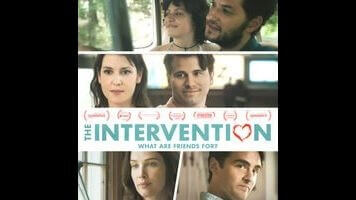Gathering seven or eight terrific actors in one location and letting them cut loose is an easy recipe for an indie film, but it’s surprising that such projects don’t do more to avoid the inevitable Big Chill comparisons. Just two years ago, the little-seen About Alex offered a minor twist on the formula: Alex (Jason Ritter), the focus of the friends’ reunion, was still alive, as his suicide attempt had failed. Now along comes The Intervention, which changes the reason for the gathering but still pretty much follows the template, right down to including a single outsider and making her a slightly younger woman who’s dating one of the guys. What’s more, Jason Ritter is again part of the ensemble! He’s surrounded by talented folks doing generally fine work—Clea DuVall makes her debut here as writer-director, and after two decades in front of the camera, she knows actors—but the movie’s stifling familiarity prevents it from making much of an impact.
Certainly, Cobie Smulders must have experienced a little déjà vu, given the running intervention gag on How I Met Your Mother. She and Vincent Piazza (best known as Lucky Luciano on Boardwalk Empire) play Ruby and Peter, a married couple with three kids who are constantly at each other’s throats. So toxic has their relationship grown that their friends have summoned them to a weekend retreat with the intention of advising them to get divorced. None of these well-intentioned amateur counselors exactly qualifies as an expert in romance, however. Recovering alcoholic Annie (Melanie Lynskey) keeps postponing her impending wedding to Matt (Ritter, Lynskey’s real-life beau); Sarah (Natasha Lyonne) feels insecure that her girlfriend, Jessie (DuVall), insists on keeping her own apartment, even after they’ve been together for three years; and the recently widowed Jack (Ben Schwartz) shows up toting the decade-younger Lola (Alia Shawkat), whose presence at an intervention for a couple she doesn’t know is questionable at best.
Like most Big Chill knockoffs, The Intervention is about evenly split between comedy and drama, and DuVall occasionally scores in both departments. Lynskey gets the lion’s share of the laughs as the most cluelessly pushy of the bunch (qualities that are exacerbated when she promptly falls off the wagon), while Schwartz, whose recurring role as Jean-Ralphio on Parks And Recreation achieved maximum goofball, provides a sober voice of reason (Jack is the only friend who thinks the intervention is a terrible idea, though he couldn’t stay away) while deftly underplaying the character’s submerged reservoir of grief regarding his late wife. When the screenplay avoids big speeches, it’s often excellent—Ruby and Peter’s terse exchange (two sentences, ten words) after they’re finally confronted is sharp enough to draw blood. That’s impressive, given that this very serious dialogue occurs not that long after Peter correctly guesses The Unbearable Lightness Of Being in a game of charades, based solely on two seconds of Ruby imitating a bear.
Distinctive, genuinely creative moments like that are relatively rare, alas, popping up just frequently enough to make the clichés all the more frustrating. Most of the characters are single-trait cutouts (poor Ritter barely gets anything to play at all), and DuVall, as a writer, is fond of overly neat symbolism, like giving Ruby a broken leg and having her hobble around on crutches for the entire film. And while the film isn’t consistently funny enough to work as a comedy, it’s also far too simplistic to achieve any lasting dramatic power. By the closing credits, the problems of all four couples have been resolved to some degree—a comforting fantasy that retroactively negates all preceding efforts at real catharsis. In the end, Jack describes The Intervention best in a line responding to Annie’s concern that Peter might be losing it. “He’s fine,” Jack tells her… but then, after a pause, he amends it to “fine-adjacent.” That’s about right.

